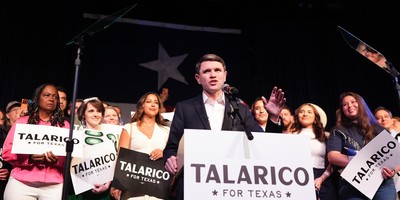A version of this column appeared originally in USA TODAY.
With Americans telling pollsters that they disproportionately disapprove of Barack Obama's job performance in his first term, advocates of his re-election must promise the public that another four years would represent a dramatic improvement.
But to keep that promise the president must overcome a "second-term curse" which constitutes one of the iron rules of the American presidency. Since the origins of the Republic, every re-elected president met with more frustrations and fewer notable triumphs in a second term than in his first.
The record of rocky, often scandal-plagued second terms applied even to the most admired chief executives, very much including George Washington (who coped with wrenching cabinet squabbles, a rebellion in Pennsylvania, and the hugely unpopular Jay's Treaty); Thomas Jefferson (whose Embargo Act left him widely reviled); James Madison (who stumbled into unnecessary war, saw the White House burned by Brits and New England states talking secession), Grover Cleveland (who presided over the devastating Depression of 1893, and top-secret cancer surgery to his jaw shortly after inauguration for his non-consecutive second term); Woodrow Wilson (who suffered a stroke and rejection of his League of Nations plans); and even FDR (who experienced the "Little Depression" of 1937-38, the disastrous "Court Packing" plan, and huge GOP gains in off-year elections before seeking his unprecedented third term in 1940).
Republican heroes Dwight Eisenhower and Ronald Reagan both weathered major scandals in their second terms (with resignation of Ike's compromised top aide Sherman Adams, and Reagan's humiliating Iran-Contra debacle) as well as witnessing huge Congressional gains for Democrats two years before they left office. Even more dramatically, Richard Nixon went from triumphant re-election (carrying forty-nine states in 1972) to resignation in disgrace mid-way through his second term, while Bill Clinton's return trip to the White House produced painful polarization and an impeachment crisis.
Recommended
Most recently, George W. Bush pushed ambitious initiatives for Social Security and immigration reform that both collapsed in his second term, before Hurricane Katrina, Democratic takeover of Congress and the economic meltdown of 2008 added to his woes.
Lincoln never confronted the second-term reverses that afflicted other chief executives because Booth killed him just five weeks after his second inauguration. William McKinley (another popular president who had just concluded a triumphant war) also avoided losing the public’s admiration when he met an assassin’s bullet just six months into his second term.
The second-term curse stems in part from the diminished influence and lame duck status that afflicts re-elected presidents. Even before the 22nd Amendment made it official in 1950, all chief executives (with the single exception of FDR) observed the traditional two term limit, meaning that their ability to punish enemies or reward friends looked far less formidable during return trips to the White House. Inevitably, second-term presidents regularly feel upstaged (especially during their last two years) by jockeying within their own parties among potential successors.
Moreover, any president deemed successful enough to earn re-election completed much of his promised agenda during a first term, so a lack of energy usually characterizes complacent "stay the course" chapter twos in the White House. As with movie sequels, the second time around generally provides a pallid repetition of what made the franchise popular in the first place, or else heads off in some bizarre and unsatisfying new direction.
Considering the unbroken pattern of diminished effectiveness for re-elected presidents, how can Obama partisans claim he will shatter tradition and prove more triumphant and effective if the electorate renews his White House lease?
The president has already anticipated this problem by blaming the frustrations and failures of his first term on intransigent, radical congressional Republicans, suggesting to voters that more cooperation from a more Democratic legislative branch will facilitate the hope and change he promised the first time. The GOP will answer this argument by pointing out that in his first two years the president enjoyed big majorities in both houses and used those majorities to pass signature legislative achievements (the Stimulus Package and Obamacare) that remain widely unpopular and contribute to public perceptions that America’s headed in the wrong direction.
Even if the President defies current projections for a tight, highly competitive electoral battle, and wins a landslide victory combined with big Congressional gains, he can expect no "honeymoon" period with media and public comparable to the euphoria that greeted the early months of his term. The Obama campaign has already acknowledged that they can only win re-election by stressing a "choice," not a "referendum"; they must make use of their billion-dollar war chest to frighten voters about the Republican opposition rather than trumpeting their own first-term accomplishments in some “Morning in America” campaign. This sort of negative and polarizing re-election fight will do nothing to soothe the divisions and bitterness that currently poison the Washington atmosphere and can only exacerbate the unavoidable negative factors that apply to even the most easily re-elected second termers.
Political operatives and spin doctors who argue the necessity of the president's re-election must make the difficult case that their candidate will defy all precedent so that the original installment of his troubled presidential adventure will give way to a more triumphant and optimistic sequel. And those who consider the Obama first term a full-blown disaster, or feel disappointed that the gifted president so clearly underperformed his supporters' soaring expectations, face a grim message regarding a potential second term: you ain't seen nuthin’ yet.
























Join the conversation as a VIP Member